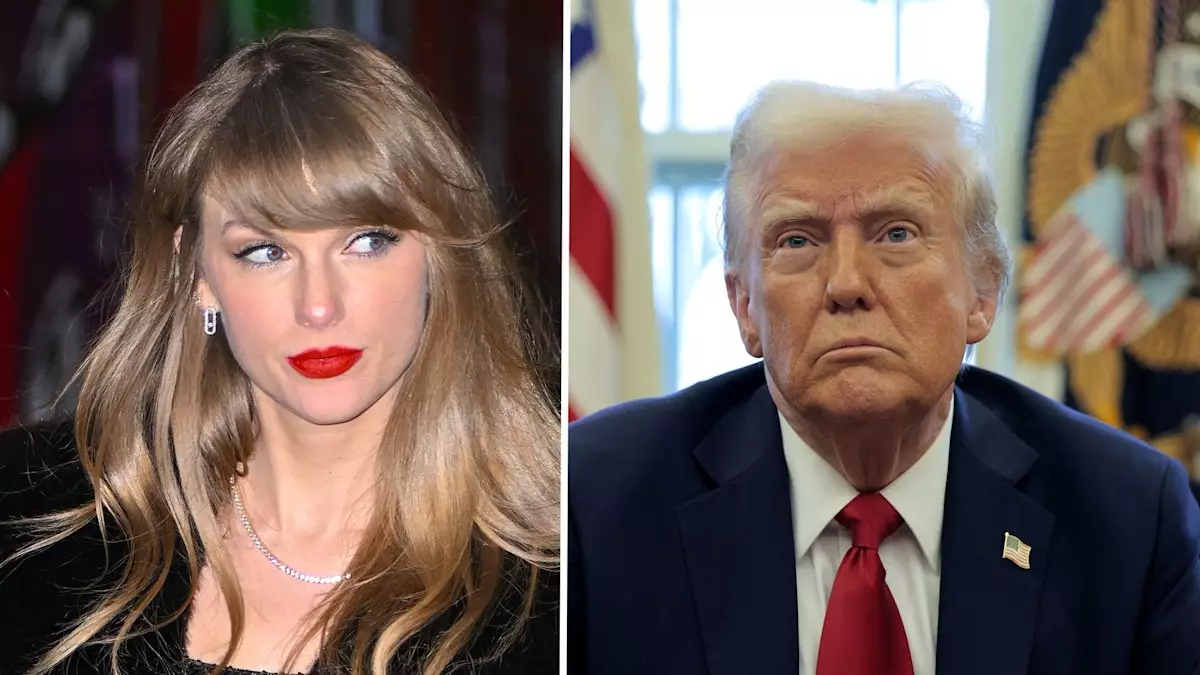In an era where social media dominates discourse, the boundary between politics and celebrity seems increasingly blurred. The recent remarks made by former President Donald Trump regarding pop icon Taylor Swift illustrate this phenomenon’s absurdity and volatility. It has become increasingly common for public figures to weigh in on each other’s domains, with Trump taking to his platform, Truth Social, to unleash scathing remarks against Swift. His comment, “Has anyone noticed that, since I said ‘I HATE TAYLOR SWIFT,’ she’s no longer ‘HOT?'” reflects a troubling convergence of personal vendettas and public policymaking. Here, Trump’s disdain for Swift—a prominent figure who publicly endorsed Democratic candidates—serves as a vehicle to showcase his own political convictions.
A Personal Vendetta or Political Strategy?
Trump’s tirade against Swift cannot be dismissed as a simple outburst; it is indicative of a deeper strategy that involves taking aim at individuals who dare to challenge his political narrative. Swift, who has shifted from apolitical pop star to a vocal advocate for social justice, particularly in her endorsement of Democrats, stands at polar odds with Trump’s base. In this light, his claim that she may “pay a price for it in the marketplace” reveals his understanding of the interplay between public opinion, celebrity influence, and economic consequences—a trifecta that can shape electoral outcomes.
At the same time, such comments sideline more pressing issues that affect everyday Americans. In questioning Swift’s public image in correlation with his own criticisms, Trump distracts from the real hardships citizens face. His words introduce a juvenile flavor to presidential communication that undermines the dignity of the office and elevates celebrity gossip to the forefront of political engagement.
Celebrities as New Political Players
The engagement of celebrities in political conversations is not new; however, it has evolved. Bruce Springsteen’s recent comments during a concert in Manchester, England, also targeting the administration, add fuel to a fire that has burned for years in the public sphere. Springsteen’s remarks about the current administration as “corrupt and treasonous” do not simply reflect individual dissatisfaction; they signal a collective ethos of discontent among many Americans. The confluence of celebrity activism and political discontent is powerful, bringing music legends and pop idols into the fray of national discourse.
Yet, Trump’s response—a criticism of Springsteen’s decision to voice such opinions abroad—highlight the disconnect within his understanding of what it means to be an American icon in today’s political landscape. Rather than embracing a constructive dialogue, Trump opts for ridicule, marking an unfortunate trend where disparagement, rather than discussion, shapes political engagement.
Family Ties: A Dichotomous Relationship
Interestingly, while the former president publicly lashes out at Swift, his own family maintains an apparent fondness for her work. His daughter Ivanka and granddaughter Arabella actively engage with Swift’s music, attending her concerts and celebrating occasions with Swift-themed festivities. This duplicity offers insight into the complexities of familial relationships within the Trump household, as political antipathy fails to overshadow personal admiration. This dissonance complicates the narrative surrounding Trump’s animus towards Swift, suggesting a layer of performative outrage that aligns more closely with political theater than with authentic sentiment.
Furthermore, this admiration juxtaposes with Trump’s public persona: it raises critical questions about authenticity in both politics and celebrity culture. Are Swift’s political endorsements genuinely affecting her popularity, or is her star power resilient enough to withstand the flak from powerful figures? Only time will tell as the bridge between entertainment and politics continues to transform.
A Cultural Turning Point?
The ongoing clashes between celebrities and political figures reflect a broader cultural moment where the stakes are higher than mere celebrity politics. They illuminate the growing tensions among different factions of American society, revealing deep-rooted divisions that extend well beyond individual personalities. With figures like Trump characterizing celebrity dissent as a personal affront, we witness a paradigm shift—one that possibly redefines what it means to engage politically in an influencer-driven age.
Whether one aligns with Trump or Swift, the implications of this dynamic are crucial to understanding our current political environment. The potential for celebrities to influence societal norms and political outcomes is increasing, presenting challenges and opportunities for both political leaders and the sorts of celebrations they once sought to control.

Leave a Reply